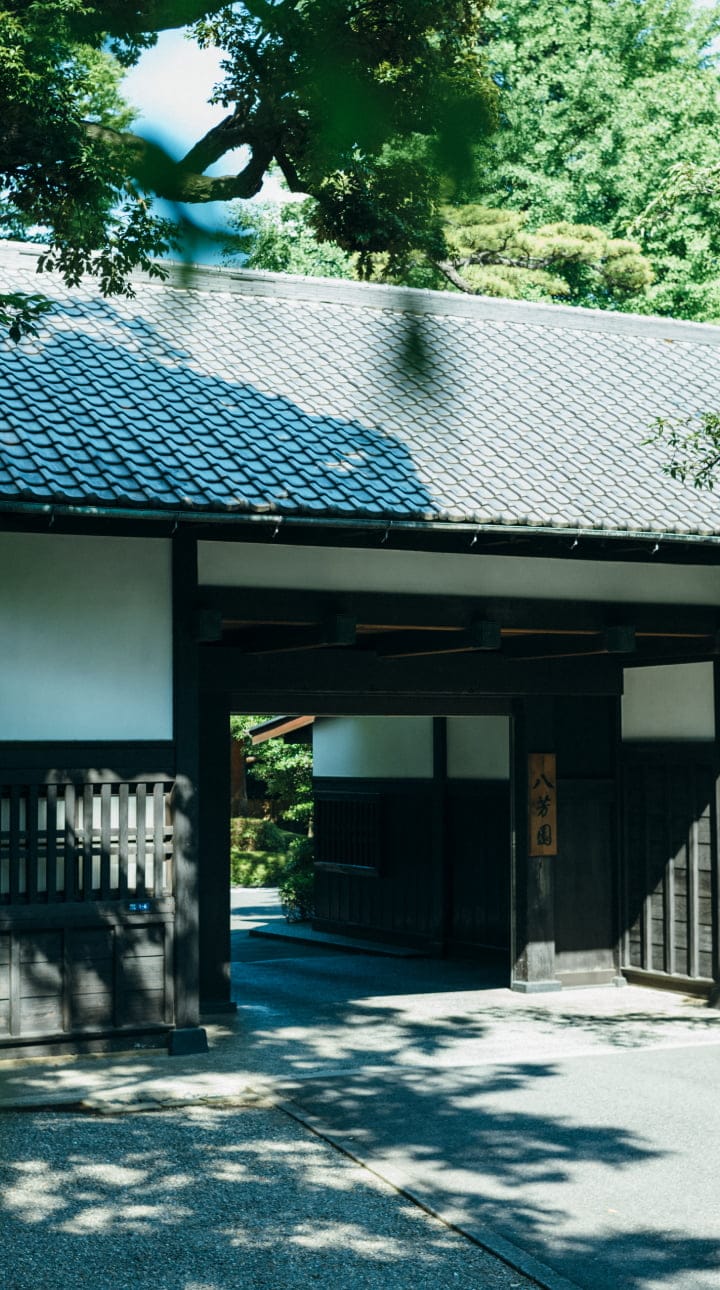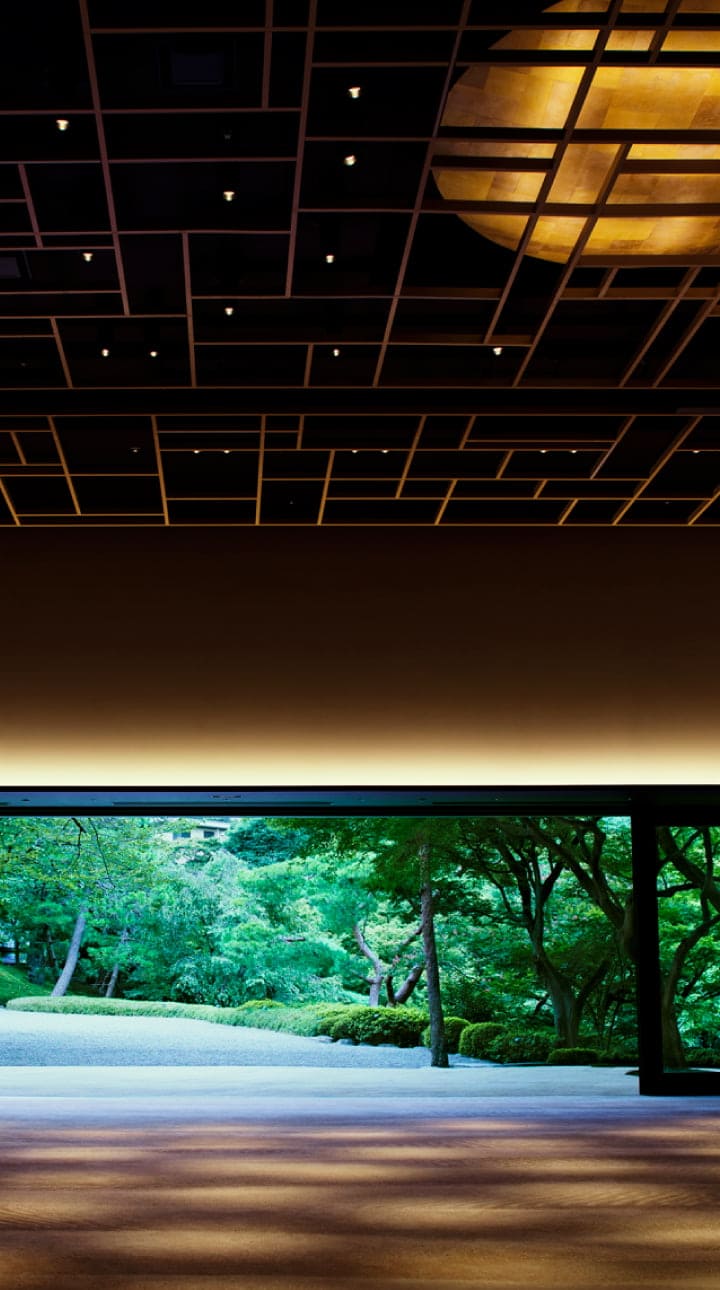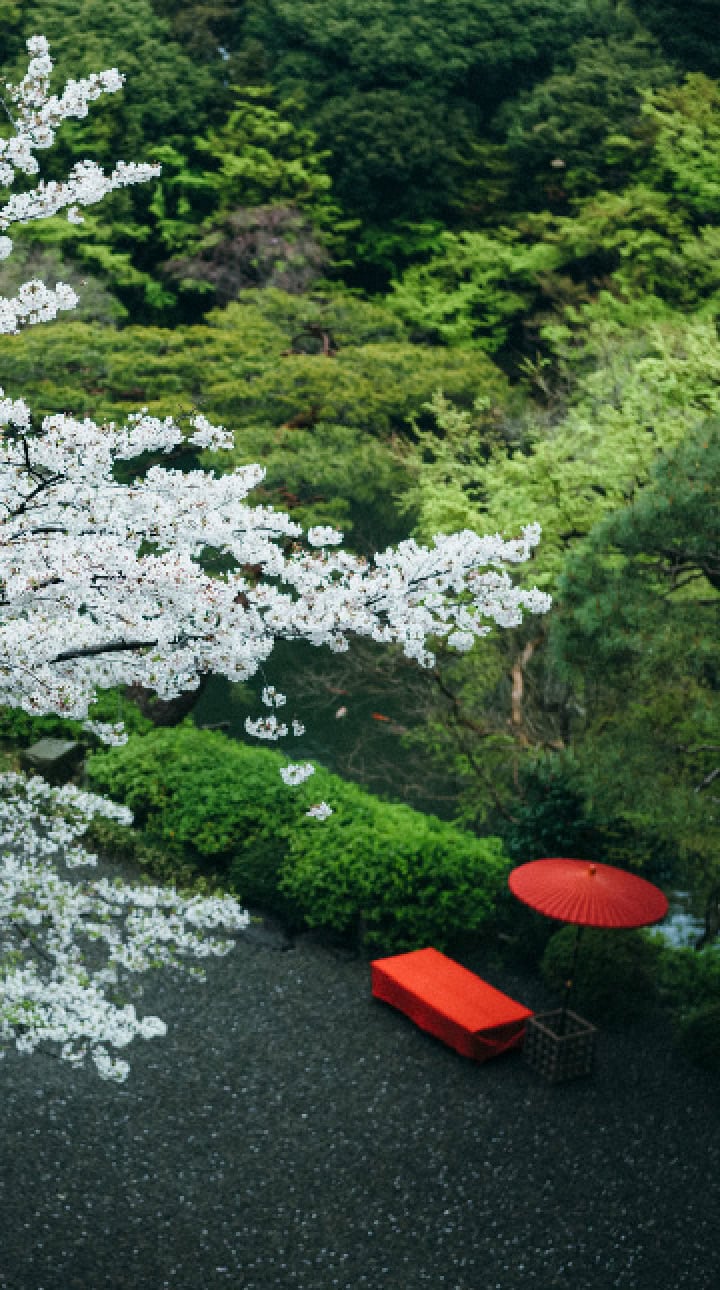今から400年前。江戸時代初期に東京白金台の地に作庭された、広大な日本庭園。そこにつくられた、ひとつの料亭から八芳園は始まりました。創業から80年、これまで八芳園が辿ってきた歩みと、「食」「事業」「おもてなし」を通した八芳園の美意識、これからの八芳園が目指す姿についてご紹介します。
History
八芳園の歩み
食、婚礼、ビジネスイベントのプロデュースや企画運営をはじめ、多様な事業を展開する八芳園。「我々は、国民食生活の奉仕者である。 我々は、日本観光の奉仕者である。」という精神のもと創業した私たちは、代々の主によってたいせつに引き継がれてきた、ひとつの日本庭園の存在によって生まれました。
歴代の主
江戸時代初期、現在八芳園が建つこの地には初代将軍 徳川 家康の側近として、天下のご意見番と呼ばれた大久保彦左衛門の屋敷がありました。終の住処としてこの場所を選んだ彦左衛門の没後、幕末維新を経て、明治の末には実業家・渋沢喜作(1838-1912)の手へと渡ります。当時は梅園としても整えられ、現在でも毎年、梅の老木がその可憐な花を咲かせます。時代が大正に移ると、日立製作所の創業者のひとりである実業家・久原房之助(1869 -1965)が渋沢邸を買い取り、その久原の情熱によって、現在の八芳園の礎となる都内屈指の大庭園が整えられていきました。「 あの松一本に惹かれたのだよ 」。久原はこの地を選んだ理由として、そう語ったと言われています。「あの松」とは、三代将軍 家光公が病床の彦左衛門への見舞いに贈り、のちに地におろされた樹齢400年を超える老松。戦後まもなくしてこの松は朽ちてしまいましたが、彦左衛門の盆栽だったとされる山茱萸(さんしゅゆ)の木が、いまも園内に残っています。
「自然を整える」という庭園観
春には桜の花霞、夏には深緑にそよぐ涼風、秋には色鮮やかな紅葉と月、冬には幽玄な雪景色に池を訪れる渡り鳥と、四季折々の風情を楽しむことができる今日の庭園の姿。現在の庭園の姿をつくりあげた久原は、「庭園を整える」という独特な考えを持っていました。よく「 自分は庭づくりなどという失敬なことはしない。自然を整えるのだ 」と口にし、植木職人にさえ草木の枝一本たりとも自由に切ることを認めない。実際に枝一本に至るまで庭内を熟知していたと思われるほど、大変な気を配っていたと言われています。この考え方を八芳園は今でも引き継ぎ、庭園を管理する守り人によってたいせつに管理を行っています。
一木一草も勝手を許さず
八芳園のあけぼの
戦後の混乱も少しずつ落ち着きを取り戻した1950(昭和25)年。当時、銀座とその周辺で割烹などを経営し、のちに八芳園の創業者となる長谷 敏司に、久原の庭園の一部と屋敷を借りて料亭を共同経営する話が知人を介して持ちかけられました。はじめは一度断りを入れた敏司。しかし一度庭園に足を運ぶと、その考えは一変しました。敗戦とその後の統治によって、日本の伝統や美しさが根絶やしにされてしまうか、という世相であった当時。由緒ある日本庭園がほとんど戦災にも遭わずに維持されていることに、深い感動と喜びを感じたのです。
日本料理は、色や形の変化と統一に心を配り、〝季〟を大切にするところに、味の芸術といわれる所以があります。そして、それがふさわしい環境の中でこそ、その醍醐味はなお一層増す。敏司はそう考え、一度断りを入れた料亭の経営を承諾。久原へと、経営方針を伝える席が設けられました。こよなく愛する庭園を貸し与えることに難色を示していた久原に、 敏司はこう語りました。「東京は日本の顔であるべきです。もしこのお庭を使わせていただくことになりましても、ただ単に料理や酒を提供する場所にはしたくありません。海外のお客様に対しては日本文化を伝える場所とし、日本人に対しては心のふるさととしたい、と願っております」。この言葉を聞き、久原は屋敷と庭園の一部を使用することに同意。自ら「八芳園」と命名しました。
その名の理由を久原は、
一、長谷観光(創業者 長谷 敏司の経営していた企業)はどの店も八開きで八の日に開業している
二、この庭は裏・表なく八方から眺めて美しい
三、「ハッポー、ハッポー」は非常に語韻がよい
四、エンは男らしく結びがある
と説明したと言います。
Food
食
日本料理は、ご提供する環境も重要な要素であり、その価値を日本人にも、海外のお客様にも届けたい。創業者の想いを引き継ぎ、八芳園は今も変わらず食を通じたおもてなしを行っています。
日本の伝統を、東京のど真ん中で
東京白金台に開店した料亭・八芳園。戦後の復興が着実に進み、庶民の生活は落ち着きつつあったものの、まだ家族連れで気軽に外食へ出かけられるような時代ではありませんでした。創業者 長谷 敏司は、八芳園を上流階級や一部の業界人だけのための社交場ではなく、若者や女性を含めた幅広い一般家庭の人たちに気軽に来てもらえる場にもしたい。そう考え、知恵を絞り様々な策を打ち出しました。
その一つに、開園直後に制作され、東京の山手線車内や目黒、五反田、品川などの各駅に掲出されたポスターがあります。
一歩はいれば暑さを忘れる
まさに東京のオアシス!
大小宴会・園遊会にご利用下さい
このポスターが人目を引き、八芳園の門をくぐる人は右肩上がりに。美しい木々の緑や池の鯉などを愛でながら庭園を散策し、涼風を感じながら飲食を楽しめることが評判を呼びました。そこから八芳園は、季節の行事にも注力。たとえば5月には新緑の庭に鯉のぼりが立ち、建物の軒には菖蒲が飾られる。お客様には菖蒲酒やちまきが振る舞われ、懐かしいお節句気分が漂う。「日本の伝統を東京のど真ん中で再現してゆきたい」という敏司の想いが次第に実を結んでいきました。
日本の味を世界へ
かつて久原 房之助の屋敷だった場所でかたちを変え始まった料亭は、現在は「壺中庵」と名前を改め、今日まで庭園内での営業を続けています。久原が整え、創業者 長谷 敏司が惚れ込んだ庭園を、全ての個室から眺めるロケーション。日本全国から厳選した旬の食材と、料理人が一番相応しいと考える方法で仕上げる、ここにしかない日本料理。唯一無二の空間で日本料理を味わっていただける壺中庵は、国内外のお客様に永くご愛顧いただいています。海外のお客様には日本文化を知っていただく場所であり、日本人のお客様には心のふるさととなりたい。創業者の想いを継承し、多くの方に日本の食材や職人の伝統的な技を感じていただける場所として、多様な食のかたちを追求しています。
壺中庵
ご予約はこちらBusiness
事業
創業事業の「食」をはじめ、多様な事業を展開する八芳園。今私たちには、これまで培った心と技を活かして、これまでの枠にとらわれない企業へと変化と挑戦の中にいます。
お客様のハレの一日をもてなす企業に
昭和30年代、日本は高度経済成長期の只中にあり、戦後しばらく質素倹約を強いられてきた人々の暮らしは大きく変わりました。「結婚」に対する意識もまた、この時期に見られた変化の大きな一つでした。八芳園は1960(昭和35)年4月、地上3階地下1階の建物に壮大な宴会場と結婚式場を備える、「八芳園洋館」を建設。いまに脈々と受け継がれるブライダル事業への進出を果たしました。お食事の時間をおもてなしする企業から、人生のたいせつな一日をおもてなしする企業へ。この事業の拡大をきっかけに、八芳園が今も大切にしている「おもてなしの心」と、企画力やプロデュース力が磨かれていきました。
婚礼の八芳園から、「総合プロデュース」の八芳園へ
これまで数多くのお客様の結婚式をプロデュースさせていただいてきた八芳園。今では「ブライダルの会社」というイメージも強く根付いているように感じます。しかし現在、八芳園が手がけるのは婚礼や食だけでなく、ビジネスイベントのプロデュースやDX推進事業など多岐に渡ります。婚礼で培った企画やプロデュースの力は、もっと広く社会のために活用できる。八芳園は今、既存の枠を超えた「総合プロデュース企業」として、地方自治体のプロデュースや観光プロデュースに力を入れています。地方自治体と連携して各地の食材や料理を開発・提案を進めるなど、人と人、人と地域、都心と地方との交流をつくり出す。そして、その出会いをきっかけに地方へと足を運ぶ方が増えていく。八芳園を通して文化の交流が生まれ、これまでにない新しい価値が創造される。これからの八芳園は、日本文化の玄関口であり、凝縮された日本の美意識を発信する「交流文化創造拠点」へ。地方自治体や、伝統を守る職人の方々との連携によって、「美しい日本」を国内外へと届けていきます。
Omotenashi
おもてなし
創業当初から、国内外の賓客をもてなしてきた八芳園。人と人とが心を通じ合わせる、細やかな気遣い。視線、動作、指の動き、表情を見て感じ、自然とさりげなく動き、振る舞う。おふたりと、そのたいせつな方々のハレの1日を祝う結婚式を通して、八芳園はおもてなしの心を磨き続けてきました。
八芳園のおもてなし
八芳園のおもてなしとは何か。まずは、象徴的なエピソードをご紹介します。
「八芳園に入社したばかりのころ。エントランスに立ち、お客様をお出迎えする研修を行っていたときのことです。クロークに預けていたキャリーバックを3つほど受け取り、ご出発される男女おふたりのお客様がいらっしゃいました。前日当園にてご婚礼を挙げられ、お荷物を取りにいらしていた所でした。ちょうどそこに先輩社員が通りかかり、『お手伝いして差し上げて。』と言われました。私はもちろん「はい」と答え、お客様のもとへ行こうとすると、『何をすべきだと思う?』と聞かれました。私は『はい。お荷物をお持ちして、正門までお見送りします。』と答えました。すると『それが八芳園ができる最高値かな?』と言われました。私は次に『そのまま坂の上までお持ちします。』と答えました。すると、また『ほんとにそこが最高値かな?』と言われました。私はしばらく考え『白金台駅の改札までご一緒して、”この度は本当におめでとうございました。ここまでしかお送りできず申し訳ございませんが、本日も素敵な1日をお送りください。”とお伝えします。』と答えました。先輩は『そうだね。それが八芳園だよ。』と送り出してくれました。入社1年目だったときのこの出来事が、全てのお客様と接するときに今も思い返されてくるのです。」
おもてなしに、正解はありません。丁寧なマニュアルを用意し、それを順守することが、必ずしもお客様にとって1番のおもてなしではないこともあります。だからこそ、八芳園のすべてのスタッフは、一人ひとりが目の前のお客様のため、その場、その瞬間にできる最高値を考えます。例えばお客様にいただいたご要望に対して「できません」とお答えすることは決してありません。どんな方法であれば実現できるのか、イメージを叶える代案はないか、とことん考え、お客様の想像を超える体験をお約束します。
食のおもてなし
日本において、結婚式はもともと自宅で執り行われるものでした。結婚式当日は玄関先に水をまき、季節の花を飾り、ゲストの顔ぶれを考えて季節の食材や、その家の自慢の料理で客人をもてなしていました。今日結婚式の多くは自宅ではなく、ホテルやレストランをはじめ、結婚式場を利用して行われています。だからこそ私たちの仕事は、おふたりやご両家になりかわって、おもてなしの気持ちが伝わる料理をお作りすることだと思うのです。
ご実家のおじいさま、おばあさまがつくったお米や野菜をつかって、ふるさとの美味しさを皆様に味わっていただいた披露宴がありました。新婦様が新郎様に初めてつくってあげたかぼちゃグラタンを再現し、新郎様がその美味しさに感動したというエピソードとともにお出しして、あたたかい拍手に包まれた披露宴がありました。
こうした披露宴でのお食事のメニューを、八芳園では新郎新婦様のお名前とともに、”Wedding Menu”としてずっと保管しています。何年、何十年と時が経って、結婚記念日や家族の記念日に帰ってきていただいたときに、あの時の思い出のメニューでお迎えできるように。八芳園は、食を通じた「心のふるさと」として、いつまでも皆様に帰ってきていただけるよう、変わらずあり続けていきたいと思います。
Purpose
日本を、美しく。
美しい日本庭園に惚れ込んだ創業者が、この地に料亭を構える決意をしてから今日まで80年以上。今私たちが想うのは、日本という国が持つ魅力です。豊かな自然と、移り変わる四季の風景。地域ごとに育まれる、固有の歴史や文化、伝統的な工芸や産業。他の国には類を見ない、独自の美の生態系がある日本という国の魅力は、まだ光が当たっていないものが数多くあると思うのです。そうした眼に見えるものだけでなく、おもてなしの心をはじめとする、日本人の心もまた、海外の方が日本を訪れたとき「美しい」と感じていただけるものの一つ。私たちは、長い時間をかけて築かれてきた美しい日本を継承し、時代にあわせてその価値を更新する企業を目指していく決意を込めて、私たちは日本の風景・文化・人々の心をもっと美しく変えていく「日本を、美しく。」というパーパスを掲げました。美しいものや体験との出会いは、きっと人々の心も美しく変えていくから。その先に、日本という国が、今よりもっと魅力にあふれる美しい国になっていくと私たちは信じています。



